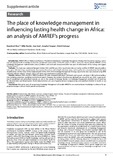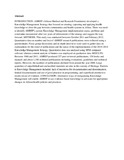| dc.contributor.author | Shoo R. | |
| dc.contributor.author | Matuku W. | |
| dc.contributor.author | Ireri Jackson Mrama. | |
| dc.contributor.author | Nyagero J. | |
| dc.contributor.author | Gatonga P. | |
| dc.date.accessioned | 2013-11-07T12:04:59Z | |
| dc.date.available | 2013-11-07T12:04:59Z | |
| dc.date.issued | 2012 | |
| dc.identifier.citation | Pan Afr Med J. 2012;13 Suppl 1:3. Epub 2012 Dec 25. | en |
| dc.identifier.uri | http://www.ncbi.nlm.nih.gov/pubmed/23467647 | |
| dc.identifier.uri | http://erepository.uonbi.ac.ke:8080/xmlui/handle/123456789/58303 | |
| dc.description.abstract | INTRODUCTION:
AMREF (African Medical and Research Foundation) developed a Knowledge Management Strategy that focused on creating, capturing and applying health knowledge to close the gap between communities and health systems in Africa. There was need to identify AMREF's current Knowledge Management implementation status, problems and constraints encountered after two years of enforcement of the strategy and suggest the way forward.
METHODS:
This study was conducted between October 2011 and February 2012. Quantitative data on number and foci of AMREF research publications were collected using a questionnaire. Focus group discussions and in-depth interviews were used to gather data on explanations for the trend of publications and the status of the implementation of the 2010-2014 Knowledge Management Strategy. Quantitative data was analysed using SPSS computer software whereas content analysis of themes was employed on qualitative data.
RESULTS:
Between 1960 and 2011, AMREF produced 257 peer reviewed publications, 158 books and manuals and about 1,188 technical publications including evaluations, guidelines and technical reports. However, the numbers of publications declined from around the year 2000. Large quantities of unpublished and unclassified materials are also in the custody of Heritage. Barriers to Knowledge Management included: lack of incentives for documentation and dissemination; limited documentation and use of good practices in programming; and superficial attention to results or use of evidence.
CONCLUSION:
Alternative ways of reorganizing Knowledge Management will enable AMREF to use evidence-based knowledge to advocate for appropriate changes in African health policies and practices. | en |
| dc.language.iso | en | en |
| dc.publisher | University of Nairobi | en |
| dc.subject | Africa | en |
| dc.subject | Knowledge management | en |
| dc.subject | databases | en |
| dc.subject | learning culture | en |
| dc.title | The place of knowledge management in influencing lasting health change in Africa: an analysis of AMREF's progress. | en |
| dc.type | Article | en |
| local.publisher | Department of Human Pathology | en |


